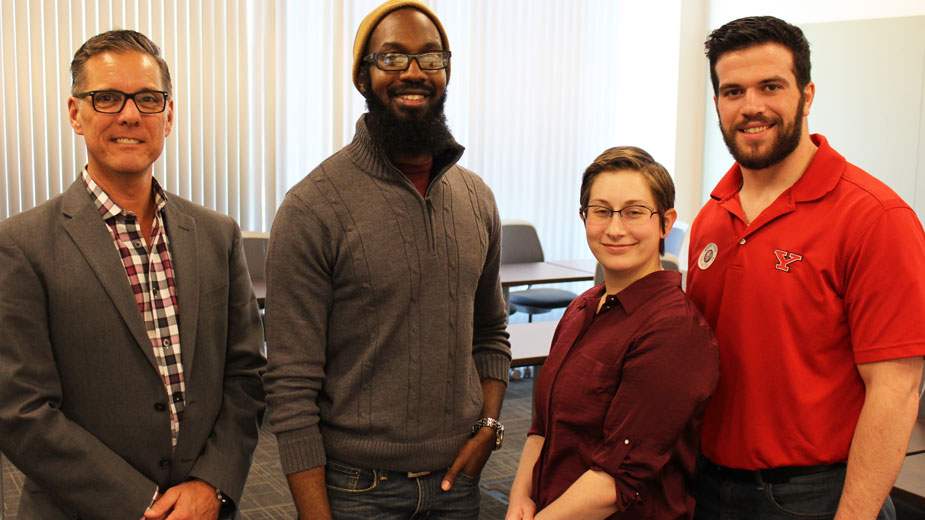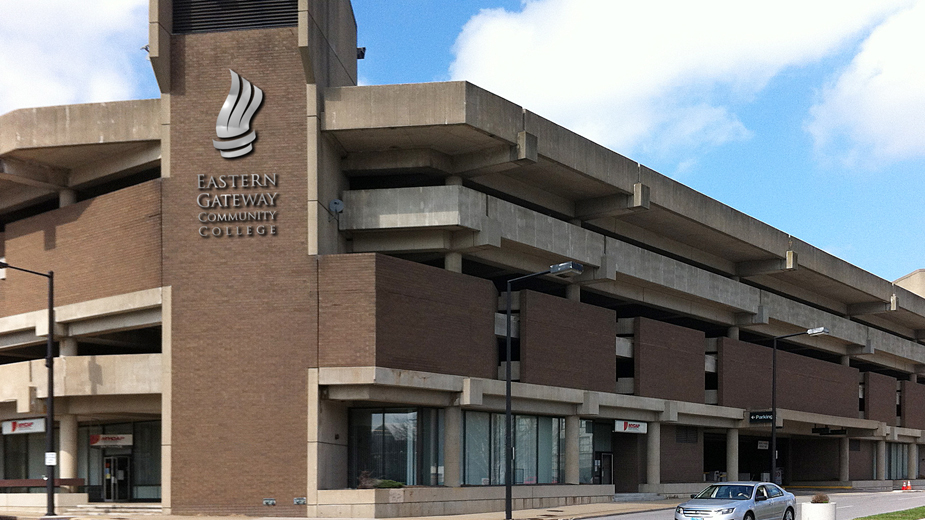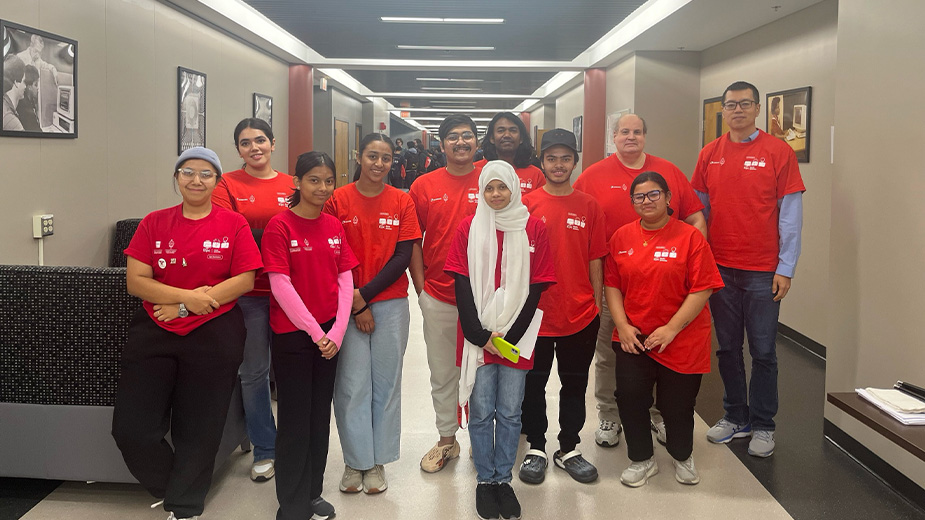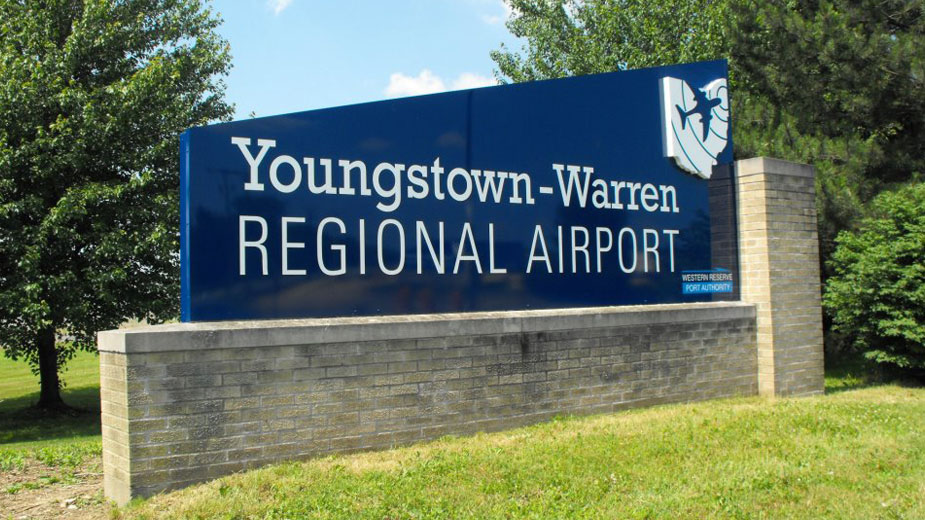Entrepreneurs Tell Students about Funding, Work Balance
YOUNGSTOWN, Ohio – Students from Youngstown State University and the C.S. Lewis Institute had a chance to pick the brains of four startup company leaders as part of the Make Youngstown technology program Wednesday afternoon.
JuggerBot 3D CEO Dan Fernback, Ving CEO Tony DeAscentis and Bravura 3D co-founders Jessie Tuscano and Brian Alls spoke with the students as part of a panel discussion to close the first day of the expo. All three companies are portfolio companies at the Youngstown Business Incubator.
“I’ll tell you what [YBI CEO] Jim Cossler told me the first time I talked to him,” Fernback said to open the discussion. “If there’s no problem to solve, then there’s no idea. You have to make sure there’s a need. And just because there’s a need doesn’t mean people will be lining up to buy your product.”
Knowing the industry that will use a product could be helpful too, DeAscentis added.
“I can have the drive to build something that will change brain surgery. But I don’t know anything about it, I won’t get far,” he said. “If you don’t have the core competency to do something, then you’ve probably picked the wrong direction to launch your business.”
Market research, Fernback said, can be what makes or breaks a startup. Once that research is done, companies can move onto development and funding, both of which can present significant challenges and quite often go hand-in-hand.
Bravura 3D is still working on prototypes, Tuscano and Alls noted, but having something physical to show investors can make a difference in whether funding sources say yes or no.
“Don’t reiterate to them that you don’t have a product yet. You have to have something,” Tuscano said. “And your development can happen so fast that if you spend all your time making sure that your product is perfect before you go them, someone else will beat you.”
Her business partner reminded the students, “Done is better than perfect. It’s better to have something than nothing.”
Among the questions asked the panel were how much funding startups need, how to balance entrepreneurial endeavors and one’s personal life, and choosing investors.
All four agreed that the balance between work and outside life is precarious for all entrepreneurs. That balance gets more difficult with a family, Tuscano said, but can be managed. At times, all said, getting out of the workplace can be a godsend.
“I make sure to spend time with my family and friends because it’s important to have that release every once in a while,” added Fernback. “But when it’s time to work and be a business, you have to turn on that switch and get things done.”
At a certain point for those starting a business, especially in the technology sector, it becomes a pointless task to count how many hours you work, DeAscentis said. Rather, it becomes about how you use the hours you work and making sure you meet deadlines.
“You have things that you know you want to do, so you get smart about allocating time,” he said. “Deadlines and prioritization are huge for you to have the time to do personal things.”
When it came time for Bravura to look for investors, Alls said he was reluctant about trading equity in his company. It’s something he built and something he has a vision for and it’s not to be taken lightly. He emphasized to the students how important it is to find the right investor rather than just the biggest.
“It’s a lot like dating. You’re marrying yourself to an investor. They have questions and want you to justify them giving you this money. And they expect a return,” he said. “If you’re not on the same page with vision and direction and pace, it might not be the best fit, regardless of how much money they’re giving you.”
Closing out the panel, the four explained how they became entrepreneurs. As they grew up, none was aware that they were developing the skills they need today. Tuscano and DeAscentis said they got into with school events and small businesses like mowing lawns. Alls’ family, he said, was full of entrepreneurs, including his grandfather, father and brother.
“When I was young my grandfather would take me with him to visit all the people he worked with. They’d just talk and talk and talk,” Alls said. “I thought it was boring then, but looking back I realized that he was building the relationships that helped him succeed.”
While the students from the Williamson College of Business Administration made up the majority of the audience for the panel discussion, four students from the C.S. Lewis Institute in the downtown also asked questions as part of their field trip.
“For them to see that there’s a lot of opportunity at that age could inspire them to mold themselves as they progress through those important years of development,” Fernback said.
The Make Youngstown expo featured 10 exhibitors at Williamson Hall at YSU as well as events at the Youngstown Business Incubator and America Makes. The second day runs from 10 a.m. to 3 p.m. today. Another panel discussion with makers will begin at 1 p.m. at Williamson Hall.
Pictured: Panel participants Tony DeAscentis, Brian Alls, Jessie Tucano and Dan Fernback.
Copyright 2024 The Business Journal, Youngstown, Ohio.



